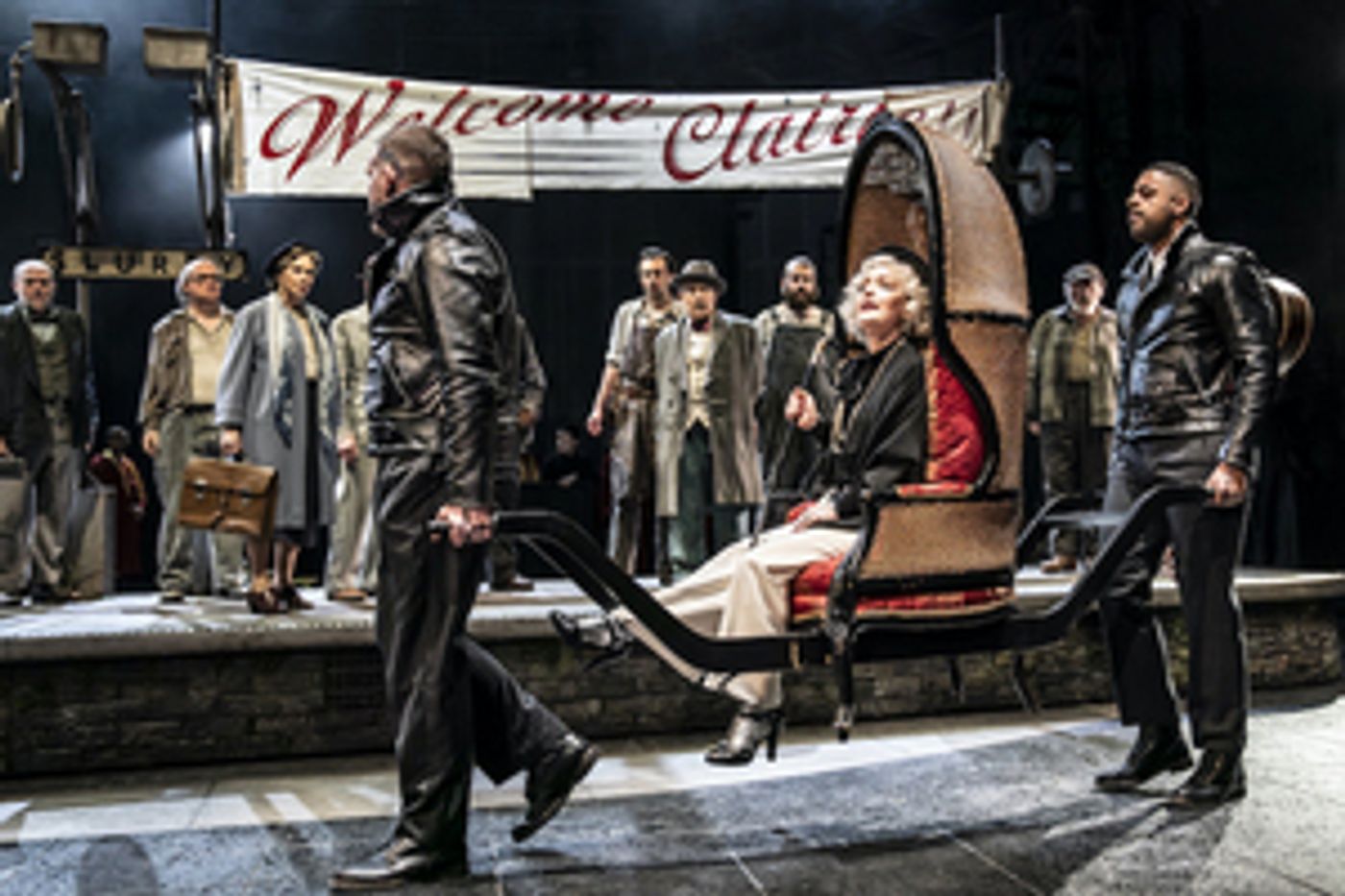Review: THE VISIT, National Theatre

![]() Three years after the National's enthralling revival of Tony Kushner's Angels in America, the playwright returns with his new adaptation of Friedrich Dürrenmatt's tragicomic 1956 parable - which has also been turned into an Ingrid Bergman-starring film and a Kander and Ebb musical.
Three years after the National's enthralling revival of Tony Kushner's Angels in America, the playwright returns with his new adaptation of Friedrich Dürrenmatt's tragicomic 1956 parable - which has also been turned into an Ingrid Bergman-starring film and a Kander and Ebb musical.
Though not quite rivalling Angels' running time, it's certainly another epic; the first preview exceeded four hours, and it's now a still-hefty three hours and 35 minutes, with two intervals. Does it entirely justify it? The short answer is no - especially since there are too many scenes without Lesley Manville's avenging angel, by far the highlight of the production.
Kushner's script retains the story beats and 1950s setting of the original, but with the action relocated to the town of Slurry in New York state, devastated by post-war recession. Its once-thriving factories have closed, trains no longer stop at their station, and even the church bell has been sold off.
Enter Manville's Claire Zachanassian, the world's richest woman, who pledges a billion dollars to save her hometown from ruin. But she has a fearsome condition: one of them must kill her former lover, shopkeeper Alfred Ill (Hugo Weaving), whose terrible actions in their youth cost her dearly.
The glamorous, outlandish, dark goddess Claire - who makes a devilish diva entrance in billows of smoke - is an irresistible creation. She's blown through eight husbands, is carried around in a sedan chair that once belonged to Lucrezia Borgia, travels with a pet panther, and lost her legs in a duelling accident and exotic plane crash; she now sports prosthetics of pure silver. She's already ensnared three of her enemies and turned them into a grotesque entourage.
It's delicious fun watching the townspeople scramble to impress her, which she shrugs off in favour of exchanging animal sex noises with Alf, or asking the adorable children who perform gymnastics for her whether they're strong enough to strangle someone. Sporting a white-powdered face, wig, extravagant clothing and jewellery, and weaponised cane, the marvellous Manville understands that, for Claire, everything is a performance, and wealth the ultimate smokescreen.
But she makes evident, too, the childhood trauma fuelling her - from the violent, alcoholic father to desperate poverty, gendered town judgement after she was slandered, and betrayal by the man she loved. That love has curdled into vengeance, and she feels trapped in Slurry, time stood still.
However, Kushner explores that theme exhaustively. The play opens with the now redundant train station, its rusty clock stuck. Citizens wax nostalgic about Slurry's glorious past, while Claire and Alf constantly relitigate their former relationship and acrimonious parting - as does the town when the details emerge. But most effective is Manville's great roar of just two words: "I'm still!".
The play is also feverishly concerned with consumerism and the corrupting effect of money - on justice, community, faith, morality - and the dangers of debt. With the promise of a billion dollars hanging in the air, stores suddenly begin offering 'charge accounts', and the previously frugal townspeople load up on goods on credit.
In Jeremy Herrin's witty staging, the space is suddenly awash with bright, shiny, colourful clothes and products (great design from Vicki Mortimer). The Slurry residents might protest to Alf that he's in no danger, but their new shoes, radios and gold teeth say otherwise. Even the priest is susceptible, as demonstrated by the ominous clang of a new church bell.
Though the mayor is adamant that you cannot "buy" justice in America, this cynical fable - and, of course, recent events - prove otherwise. The cloaking of conspiracy to murder in democratic values is particularly chilling, and there's pointed commentary from Kushner; when grumbling locals blame a Jewish conspiracy for their economic plight, they're admonished with "Desperation is no excuse for stupidity".
Yet it ultimately feels like an unnecessarily long recounting of a fairly straightforward revenge tragedy-cum-social satire. Hugo Weaving powerfully conveys Alf's haunted, hunted plight, as he wrestles with the realisation that he birthed this sin, but it's a journey that could easily be condensed. Likewise, the meandering prologue ahead of Manville's arrival.
Kushner also nods to Greek tragedy, crisis of faith, economic and Marxist theories, myth-making and news media framing, among others, but more as window-dressing than profound exploration, while Herrin's production is teeming: as well as the tumbling tots, we get a huge cast, plus supernumeraries, a choir, a Thunderbird car, numerous sets, the roar of passing steam trains, a live band, and a hanging deer carcass.
It's often engaging in the moment, but there's a sense of filling space because of the script's length, rather than everything being vital to the best telling of this drama. In fact, two of the strongest moments are pithy and silent (with a vital assistant from movement director Aletta Collins): the townspeople gathering like a zombie horde at the train station, and the climactic reckoning.
There's good support from Nicholas Woodeson's self-important mayor, Richard Durden's dour butler, Joseph Mydell's blustering priest, and in particular Sara Kestelman's soused, truth-telling school teacher, plus an effectively melancholy, film noir-esque jazz score by Paul Englishby.
But, while there's vast potential for this tale of temptation, unchecked capitalism and moral compromise, the audience is too often ahead of the action, dulling the tension. A few judicious trims, and more Manville, and this Faustian fable would really chill.
The Visit at the National Theatre until 13 May
Photo credit: Johan Persson
Reader Reviews
Videos

